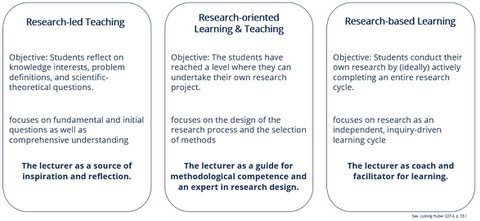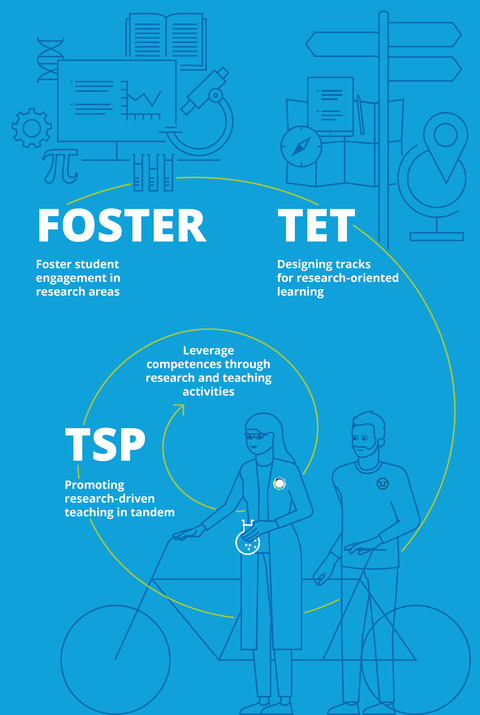Research-oriented teaching
Table of contents
What is research-oriented teaching?
Research-oriented teaching at TU Dresden is the generic term for the concepts of research-led teaching, research-oriented learning & teaching and research-based learning.
TU Dresden promotes research-oriented teaching through the three program lines FOSTER - Funds for Student Research, Teaching Synergies Program(TSP) and Teaching Excellence Tracks(Teaching Excellence Tracks). The aim of the three Excellence Programs is for students to develop research-related skills through excellent research and teaching activities.
After all, learning and research are two sides of the same coin. The integration of research-related teaching and learning activities into university teaching and the course of study brings numerous advantages.
Why combine research and teaching?
By closely linking teaching and research, students can learn in a practical way and be introduced to scientific methodology and ways of thinking at an early stage. This not only promotes a deeper understanding of the subject content, but also the development of critical thinking skills and the ability to deal with uncertainties in everyday research. Students are enabled to develop their own questions and research designs to actively participate in research processes.
In education through science, the focus is on searching and finding, problematizing, understanding, being astonished, investigating and communicating. Research-oriented teaching does not focus on knowledge that has already been created, but on an open approach to unanswered questions with the aim of gaining knowledge - the focus is not on providing ready-made answers, but on jointly developing new insights.
Research-oriented teaching concepts
In recent years, university teaching has turned towards intensive links with research. This dynamic has led to the emergence of a multitude of terms and concepts that have often become blurred.
Our aim is to present three different concepts that can be used to link teaching and research - and to make them comprehensible by means of clearly defined terms. What they all have in common is student orientation and the integration of suitable teaching methods to promote research-based learning, although the scope of student research activities varies in the different approaches.
At TU Dresden, we rely on the preliminary work of Ludwig Huber (2014), who focuses primarily on the objectives behind the concepts.

From Research-led Teaching to Research-based Learning
Further information on possible teaching and learning activities and forms of teaching for the three research-related concepts can be found in the drop-down boxes.
Research-led Teaching is about helping students develop a fundamental understanding of the initial questions that scientific (research) work addresses. In doing so, they actively engage with knowledge interests, scientific theoretical questions, and problem definitions. Students reflect on how scientific questions arise and what constitutes “good research.” The focus is therefore on theoretical foundations and the ability to understand scientific thinking.
Research-led Teaching lays the theoretical foundation on which independent research (e.g., in research-based learning) can later build.
Exemplary teaching and learning activities
-
Discussions about scientific theories or paradigms
-
Analysis and comparison of research approaches
-
Critical examination of studies
Exemplary teaching formats
- Lectures
- Excursion to research facilities
- Journal club
Research-oriented Learning and Teaching is about preparing students for their own independent research. The aim is for them to acquire the necessary methodological competencies to be able to work independently in a scientific context.
The focus is on designing the research process: Which methods are suitable for which research questions? How do I plan a study?
Research-oriented Learning and Teaching equips students with the methodological and structural skills they need to conduct their own research in the next step. It bridges the gap between the theory and practice of research.
Exemplary teaching and learning activities
-
Discussions about the advantages and disadvantages of various research methods
-
Exemplary application of various research methods
-
Reflection on completed research projects with regard to the research methods used
-
Carrying out laboratory tasks, measurements, or investigations
-
Preparing and conducting field studies
-
Exemplary analysis of data sets
Exemplary teaching formats
-
Seminars on research methods or scientific work
-
Research exercises or internships (in the laboratory)
-
Methodology workshops, writing workshops
In Research-based Learning, students themselves are actively at the center of the research process. The aim is for them to complete a full research cycle as independently as possible: from developing a research question to collecting data and evaluating and presenting the results.
Research-based Learning is a self-directed, knowledge-driven learning process in which students generate and reflect on new knowledge through their own research.
Research-based Learning as defined by Ludwig Huber (2009, S. 2)
"Research-based learning differs from other forms of learning in that learners design, experience, and reflect on the essential phases of a research project aimed at gaining insights that are also of interest to third parties—from developing questions and hypotheses to selecting and executing methods to testing and presenting results in independent research or as an active part of an research group."
Exemplary teaching formats
-
Seminars based on the concept of ‘Research-based Learning’
-
Research module
-
Research colloquium (accompanying final theses)
Advice & support
 © TUD | Michael Kretzschmar
© TUD | Michael Kretzschmar
Consultant
NameLaura Kaden
Teaching Synergies Program (TSP)
Send encrypted email via the SecureMail portal (for TUD external users only).
Supporting material for the concept of research-based learning:
Sonntag et al. (2018). Research-based learning in the seminar. A guide for teachers
Scope for design in research-based learning
Island of research - an interactive collection of materials for research-based learning
Stimulating reflection in research-based learning. A guide for self-study and further education

